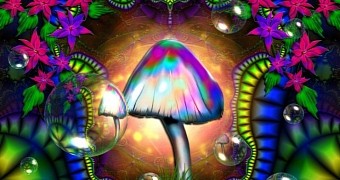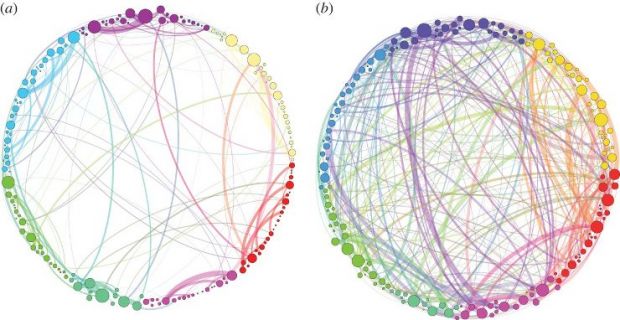In a recent paper in the Journal of the Royal Society Interface, researchers offer an explanation for how and why people who consume magic mushrooms experience mood swings, altered perception, and sensory overload.
Long story short, the paper in question argues that magic mushrooms change the way people feel about themselves and the world around them by creating new connections in the brain and getting regions that usually ignore each other to start communicating.
To get a better idea of what the scientists behind this new research project mean when they say that psilocybin, i.e. the active ingredient in magic mushrooms, causes the brain to become hyperconnected, check out the picture below.
Of the two images, the first shows a simplified illustration of the connections documented in the brains of volunteers who were administered a placebo. The other one details the connections active in the brains of study participants who were given psilocybin.
So, what exactly happens in the brain?
As shown by previous investigations, the active ingredient in magic mushrooms binds with the very same brain receptor that handles serotonin, which is a naturally occurring compound known to influence mood, sleep and even appetite.
Simply by binding with this receptor, psilocybin alters the brain's normal patterns of communication. Thus, as already mentioned, it encourages normally unconnected brain regions to start communicating with one another.
Interestingly enough, evidence obtained while studying the brains of people on psilocybin with the help of functional magnetic resonance imaging (fMRI) indicates that these newly formed connections are not what some would call hectic. On the contrary, they are well organized and stable.
“We can speculate on the implications of such an organization. One possible by-product of this greater communication across the whole brain is the phenomenon of synesthesia which is often reported in conjunction with the psychedelic state,” the scientists write in their paper, as cited by IFL Science.
Despite the fact that brain function returns to normal as soon as the drug wears off, study co-author and King's College London physicist Paul Expert, together with his colleagues, maintains that there are people who are more open and happier even 14 months after such an experience.
Using magic mushrooms to treat brain conditions
Writing in the Journal of the Royal Society Interface, specialist Paul Expert and colleagues argue that, all things considered, it might one day be possible for magic mushrooms to serve as an inspiration for drugs intended to treat various neurological conditions.
Thus, the scientists argue that, since psilocybin alters mood by toying with the brain's chemistry, it might be possible to use it to alleviate depression symptoms. Still, it's important to note that more detailed investigations into how magic mushrooms alter the human brain are very much needed.

 14 DAY TRIAL //
14 DAY TRIAL // 

